Student Profiles
Elnaz Alimi
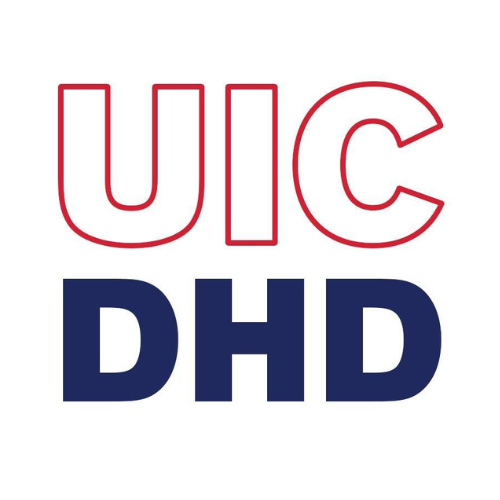
Meet Elnaz
Why did you choose DHD at UIC?
UIC is the one and only school in the U.S. that offers this program and the faculty members are inspiring leaders and internationally well-known in the area that they research.
What do you want to do with a DHD degree?
Working towards improving participation for refugees and asylum seekers.
Research Interests
Community Participation of migrants with disabilities and chronic conditions
Awards and Honors
UIC Department of Occupational Therapy Research Award
AUCD 2020 Illinois Emerging Leader
Schweitzer Fellowship 2022-2023 cohort
Education
Bachelors in Occupational Therapy- Tehran University of Medical Science, 2013–Masters in Occupational Therapy, Shahid Beheshti Univesity of /medical Sciences, 2015–Doctor of Occupational Therapy, University of Illinois at Chicago, 2020
Amelia-Marie Altstadt
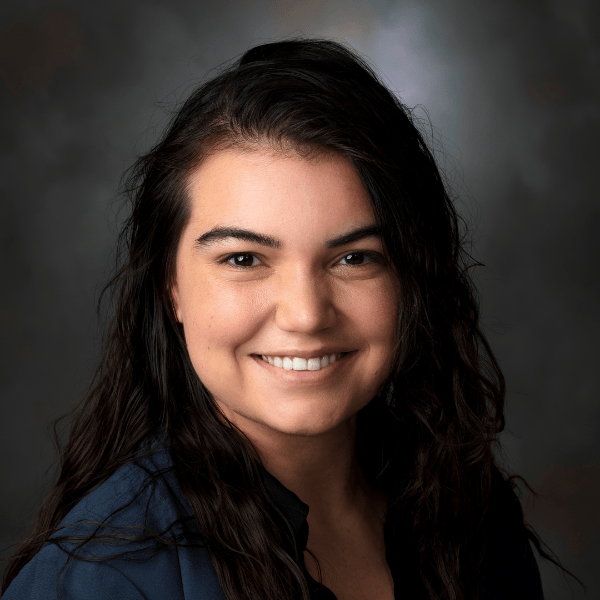
Meet Amelia-Marie
Amelia-Marie Altstadt (they/she) is a PhD Candidate in Disability Studies at the University of Illinois, Chicago and a Pipeline to An Inclusive Faculty Fellow originally from San Diego, California (Kumeyaay land).
Disability culture and the arts, especially as these subjects relate to children of disabled adults (CODISA), in theatre and other media are their loves within the field of Disability Studies. Moving between social science and humanities style research to address different populations, they bring an interdisciplinary flair to thinking about these subjects, especially enjoying collaboration with others. Through involvement in local Chicago organizations like Bodies of Work, Access Living, and Naked Angels’ Tuesdays at 9 cold reading series, she loves supporting and bringing theatrical arts directly to the community through teaching, writing, and access work. A playwright and a scholar, she has written two plays, “Up the Five” and “ADHD Ballet”, with the goal of making disability studies research and disability experiences more accessible to the general public.
Previously they were a student affairs professional at the University of Nebraska-Lincoln who served low-income, first-generation students primarily of Latinx, Black, and Indigenous backgrounds from both rural and urban settings. In addition to advising, they taught Honors courses in person and asynchronous online courses.
They most recently, in 2025, have earned the Midwest Popular Culture Association Gary Burns Travel Award for an upcoming paper on CODISA representation in theatre. In 2024, they received the Disability Visibility Fellowship for the Unexpected Writing Shape Academy. They were the Association of College Personnel Administrators (ACPA) Coalition for Disability’s recipient for the Disability Leadership Award in 2022. They, additionally, are a proud hermana of Sigma Omega Nu (ΣΩN), Latina Interest Sorority, Incorporated.
To keep up to date on Amelia-Marie, find them on Instagram, and their website.
What do you want to do with a DHD degree?
I want to impact the way disabled people who have or raise children are perceived, bringing CODISA narrative to the forefront. I would love to consult for universities and theatres on disability culture and accessibility, and tour to speak on my research interests. My wildest dreams include starting or supporting a new PhD in Disability Studies program at a university within the United States of America.
Research Interests
My research interests include children of disabled adults (CODISA), disability culture, theatre, performance studies, autoethnography as methodology, and ethnodrama.
Selected Presentations
Altstadt, A.-M. (2025, November 20-23). Plays as alternative archives, playwrights as alternative archivists: Susan Nussbaum’s solo show “Michuganismo”. In Disability Studies I: Crip Bodies, Crip Desire [Paper presentation]. 122nd Annual Pacific Ancient and Modern Language Association Conference, San Francisco, CA, United States. In-Person.
Altstadt, A.-M. (2025, October 3-5) Disability, parenthood, and the CODISA experience in Next to Normal. In Noonan, B., Altstadt, A.-M., & Weiss, F. What, there’s a disability narrative?! Uncovering disability knowledge in media [Paper presentations]. Midwest Popular Culture / American Culture Association, Iowa City, IA, United States.
Noonan, B. Altstadt, A.-M., Young, J., Bridger, M., Weiss, F., Erlikh, S., Hudson, T. (2025, April 7). Access as praxis: A conversation between disability arts and culture practitioners. [Conference presentation]. Symposium for Disability and Accessibility at Yale, New Haven, CT. United States. Virtual.
Selected Publications
Altstadt, A.-M. K., & Martinez, B. Z. (2025, September 24). The Sigmas, the SONs, the Sunnies That Too: Latinidad affirmation through a Latina interest sorority and the impact on entering student affairs. In Sasso, P. A., & Paladino, D. (Eds). Blurring Boundaries and Binaries: Belonging, Gender, & Mixed Heritages in Higher Education in the United States. Charlotte, NC: Information Age. [Multiracial Book]. Information Age Publishing.
Altstadt, A.-M., D’Souza, J., & Edelstein, J. (2025, June 3) Integrating disability culture to alleviate hidden labor costs for disabled graduate and professional students. In Bondi, S., Tran-Parsons, U., & Kanagala, V. (Eds.). Fostering equity and inclusion in graduate education: Key strategies and perspectives. Routledge.
Sasso, P.A., Altstadt, A., & Bullington, K.E. (2024). The Academic Oratory Tax Paid by Undergraduates as Persons Who Stutter. The Review of Higher Education 47(3), 347-372. https://dx.doi.org/10.1353/rhe.2024.a921606.
Awards and Honors
Midwest Popular Culture Association Gary Burns Travel Award, 2025; Disability Visibility Fellowship, 2024
ACPA Faculty Racial Justice and Decolonization Institute, Scholarship Awardee, 2023
Pipeline to an Inclusive Faculty Fellowship Recipient, University of Illinois at Chicago, 2023–Present
Best Session Award, Academic Advising Association Conference, 2022
Disability Leadership Award, Association of College Personnel Administrators’ Coalition for Disability, 2022
Leah Bernard
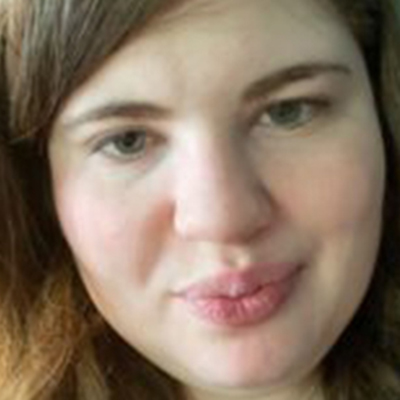
Meet Leah
Why did you choose DHD at UIC?
The Department of Disability and Human Development is recognized nationally and internationally for its contributions to disability studies. Faculty, staff, and students are actively contributing to research and community efforts. Furthermore, the department is connected to the AUCD network.
What do you want to do with a DHD degree?
My future goals include research to create changes in access to health care and mental health care for persons with disabilities, extend disability education across interdisciplinary groups, and expand leadership across disability communities.
Research Interests
Broadly, my research interests involve health disparities among people with disabilities. In particular, I am interested in the role of social determinants of health in access to health care and mental health care for adolescents with disabilities.
Education
MSW, Master of Social Work, University of South Dakota, 2020 BA, Psychology and Sociology, Southwest Minnesota State University, 2018
Maggie Bridger
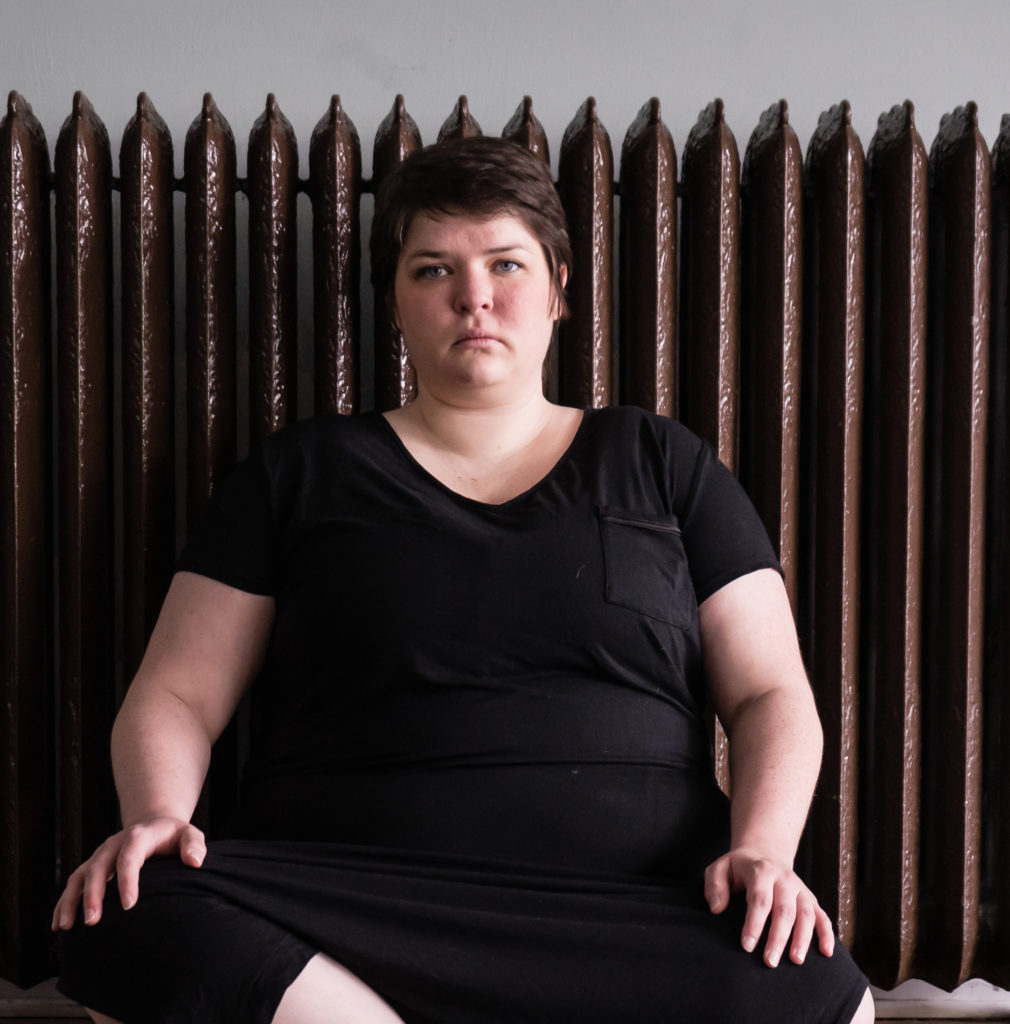
Meet Maggie
Maggie Bridger (MS) is a PhD Candidate at the University of Illinois, Chicago in the Department of Disability and Human Development. As a sick and disabled dance artist, her research and artistic interests center around disabled bodyminds in dance, with a focus on reimagining pain through the dancemaking process. Maggie is a co-founder of the Inclusive Dance Workshops, for which she and her project partner, Sydney Erlikh, received a 2021 Chicago Area Albert Schweitzer Fellowship. Maggie has worked as an access consultant and coordinator for organizations such as 3Arts and Synapse Arts. Maggie’s writing has been published in the Canadian Journal of Disability Studies and she is co-writing a chapter on the history of integrated dance in Chicago which will appear in the forthcoming edited collection, Dancing on the Third Coast. She has been invited to speak at Cottey College, Columbia College Chicago, Loyola University and the University of Illinois, Urbana- Champaign. Maggie is a 2022 Dance Studies Association Administrative Fellow. Maggie was part of the inaugural cohort of the Dancing Disability Lab at UCLA, serves on the committee to organize Chicago’s integrated dance concert, CounterBalance, and was one of Synapse Arts’ 2021 New Works artists. Her work has been commissioned by MOMENTA Dance Company, a physically integrated dance company in Oak Park, IL. Maggie is a 2022 Artist in Residence with High Concept Labs. In the Fall of 2022, she is in residence at the Chicago Cultural Center’s Learning Lab where she is leading an initiative entitled, “Cultivating Chicago’s Disability Dance Community.”
Why did you choose DHD at UIC?
I was drawn to UIC because of Chicago’s vibrant history of disability art and the department’s involvement in the disability art community via Bodies of Work.
What do you want to do with a DHD degree?
With my degree, I hope to continue to uplift, create, and share a disability-centered approach to dancemaking and pedagogy.
Research Interests
Disability Dance, Disability Arts and Culture, Pain Studies, Dance Studies, Performance Studies, Ethnography
Selected Presentations
“Sustaining a Bodymind: Disability and the Value of Moving With/In Pain.” Dance Studies Association, New Brunswick, NJ, October 10-17, 2021. “Shared Time: Collaborative Inclusive Dance Making at a Distance.” ADA30 Symposium at Oregon State University, Virtual, May 4-27, 2021. “Disability Culture in Practice.” NDEO National Conference, National Dance Education Organization, Virtual, October 23-25, 2020.
Selected Publications
Bridger, Maggie, Sydney Erlikh, and Chun-shan Yi. “Reverberation! A New Wave in Disability Art.” Canadian Journal of Disability Studies 10.2 (2021): 7-26. Bridger, Maggie. “Maggie Bridger: Responding to Netta Yerushalmy’s Paramodernities #6.” On the Ground, The Dance Center of Columbia College Chicago, https://dance.colum.edu/pararesponse-6.
Awards and Honors
2022 Independent Artist Program Grant, Chicago Department of Cultural Affairs and Special Events 2022 High Concept Labs Artist in Residence 2022 Ethel Louise Armstrong Grant, Department of Disability and Human Development, University of Illinois, Chicago 2021 Synapse Arts New Works Artist 2019-2020 Chicago Area Albert Schweitzer Fellow
Education
MS, Disability Studies, University of Illinois, Chicago, 2021. BA, Dancemaking & Dance Studies, Columbia College Chicago, 2011. AA, Cottey College, 2008.
Odile Carroll
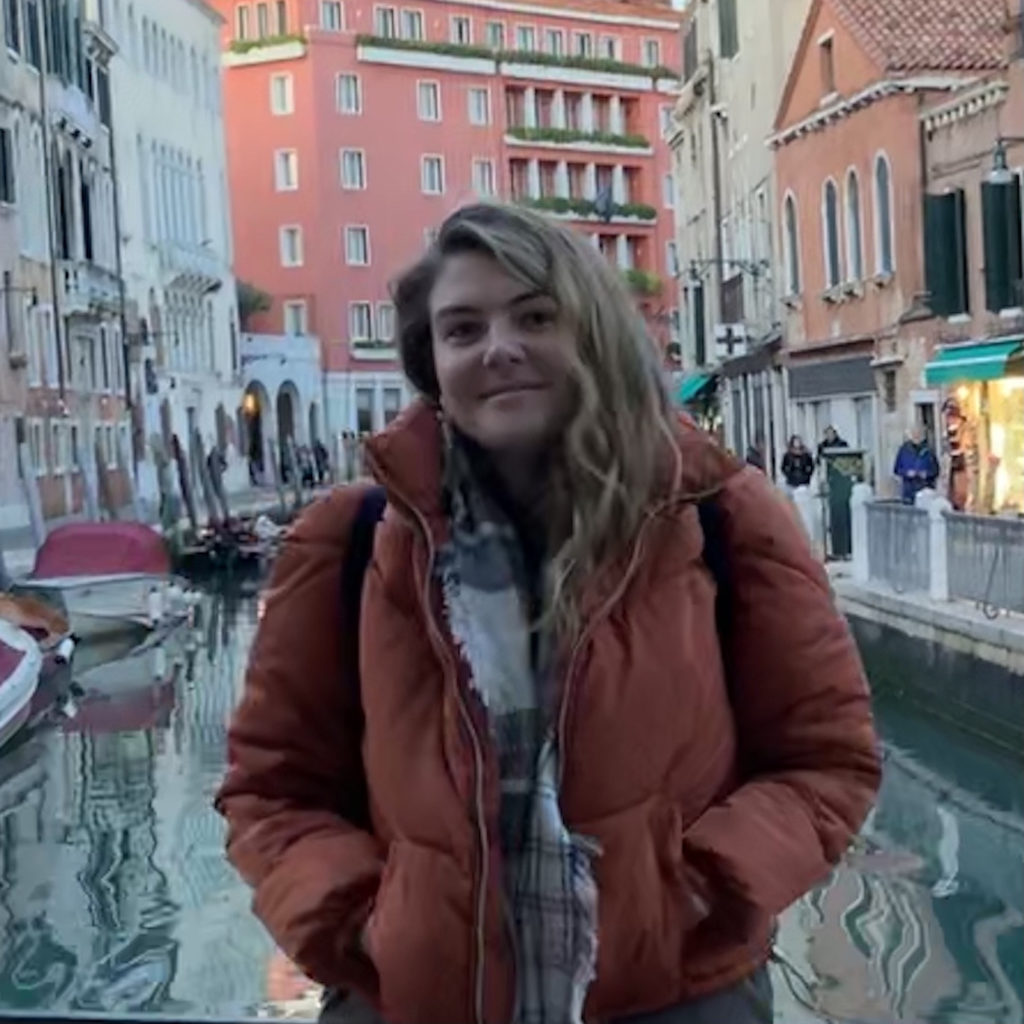
Meet Odile
My pronouns are she/her and I am a first year PhD student in Disability Studies at UIC, and originally from the DC area. I moved to Chicago from Vermont, where I lived after I finished my master’s degree in California. My master’s thesis research explored the impact of recent Medicaid funding changes on a specific model of home and community based services in the United States, and how this change affected their conceptualization of ‘good care.’ Though I am formally new to the field of Disability Studies, I first developed an interest in residential options for intellectual and developmental disability as a family member, and have since found a lifelong passion for disability advocacy and the politics of care.
Why did you choose DHD at UIC?
I chose this program because of its unique position as a full and autonomous department of Disability Studies with so many incredible and talented faculty, and because of its consistent work with various community stakeholders and organizations around Chicago.
What do you want to do with a DHD degree?
I am not sure yet-I would like to continue working on improving and complicating care for intellectual and developmental disability, but I have yet to determine what form that will take—in or beyond academia.
Research Interests
Residential care settings for I/DD
Homemaking
Care work
Ethnography
Affect theory
Inclusive methodology
Education
MS, Community Development, The University of California Davis, 2020. BA,
Psychology, Vassar College, 2015
Claudia Castillo Ayala
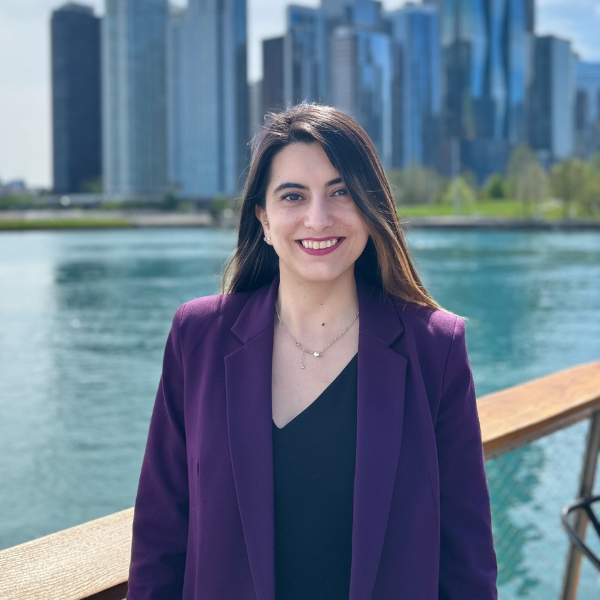
Meet Claudia
Claudia Castillo is a PhD student in Disability Studies at the University of Illinois Chicago. Her research focuses on the intersections of migration, race, and disability, examining how migration processes can be disabling and how systemic inequities affect immigrant children with disabilities. With a background in international relations, public policy, and diplomacy, she has over 15 years of experience working with Mexican migrant communities in the United States, bridging research, policy, and advocacy. She is part of the Disability and Immigration Taskforce of Illinois (DITI) and contributes to projects on disability, leisure access, and community engagement through the University of Illinois and the Great Lakes ADA Center.
What do you want to do with a DHD degree?
Through my doctoral work, I would like to keep working on policy and advocacy, strengthening international and national frameworks that protect the rights of people with disabilities on the move. As a mother of a child with a disability, I want to build a more inclusive world where migration and disability are addressed with equity and justice at the global level.
Research Interest
Migration and Disability
Awards and Honors
UIC DHD/OT Black and Latinx Student Scholarship, University of Illinois Chicago (2025).
“Soy el Futuro” Scholarship, Illinois Latino Legislative Caucus, (2025)
Scholarship for Postgraduate Studies in Science and Humanities Abroad, Mexico’s Secretariat of Science, Humanities, Technology, and Innovation (SECIHTI), (2025)
Daniel P. Cochrane
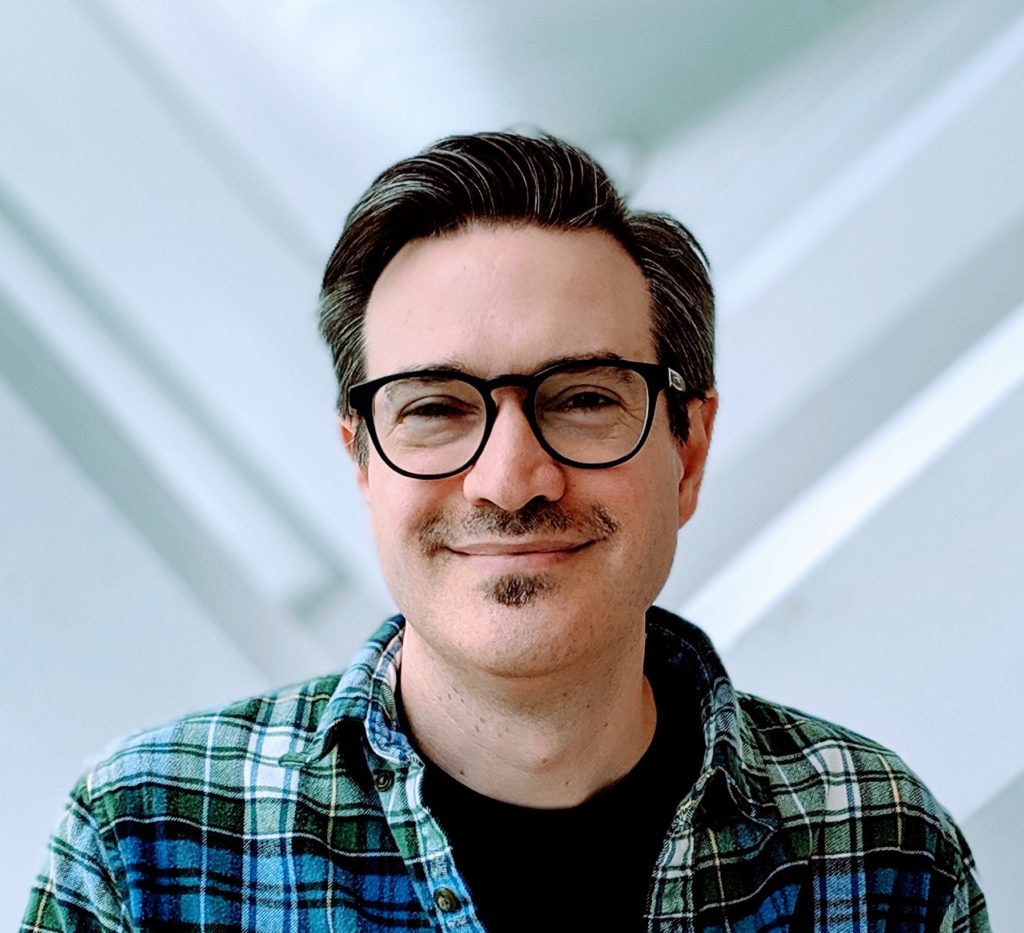
Meet Daniel
I am a RESNA-certified assistive technology specialist and former special educator with 25 years experience in K12 education. Currently, I serve as a clinical instructor in the UIC Assistive Technology Certificate Program, teaching courses on AT in education to working professionals and providing AT services through the Assistive Technology Unit.
Why did you choose DHD at UIC?
I was introduced to the field of disability studies while completing my master’s in DHD at UIC a decade ago and always wanted to continue exploring the intersection of assistive technology and disability theory.
What do you want to do with a DHD degree?
I want to deepen my understanding of the mechanisms of disablement so that I can be a more effective advocate and educator in the area of assistive technology.
Research Interests
I’m interested in building capacity for the assistive technology (AT) decision-making process in K12 special education through a design science approach that combines the practical with the theoretical. I’m particularly interested in the ways ableism plays a role in limiting AT decision-making and how considering AT might open a space for discussions about changing the environment rather than the person.
Selected Presentations
Cochrane, D. (2020, Sept 23). Building a common language for school-based AT services [Conference session]. RESNA Virtual Conference, Washington DC.
Cochrane, D. (2020, October). Beyond the SETT Framework: Integrating AT into the common language of the problem-solving process [Recorded conference session]. Closing the Gap Conference, Bloomington, MN.
Cochrane, D. (2020, October). Pathways to expertise: Training and professional credentialing in AT [Recorded conference session]. Closing the Gap Conference, Bloomington, MN.
Selected Publications
The IRIS Center (2020). Remediation vs compensation; Implementing AT; Instructional considerations; Ongoing monitoring of AT [recorded interview segments embedded in online training module]. Assistive technology: An overview. https://iris.peabody.vanderbilt.edu/module/at/#content pp. 4, 5, 7.
Cochrane, D. & Key, K. (2016). Assistive technology as AT for writing: A guide for K-12 education
Self-published free ebook for practitioners available at
https://pub.lucid.app/2f091482-82da-44a9-b8da-0f9c52f81482/
Awards and Honors
2017 – Distinguished Service Award, Rehabilitation and Assistive Technology Society of North America (RESNA)
2013 – Achievement Award for Outstanding Personal and Professional Achievement, UIC College of Applied Health Sciences
Education
MS in Disability and Human Development, University of Illinois at Chicago, 2012. Campus Certificate in Assistive Technology, University of Illinois at Chicago, 2009. MA in Teaching Special Education, National-Louis University, Chicago, IL, 2000. B. Music Education Bethel College, St. Paul, MN, 1991
Randy D. Colón

Meet Randy
Randy D. Colón is a PhD student in Disability Studies and a Research Assistant at ADA-PARC. He is a disabled person himself and is interested in partnering with disability advocates to empower disability communities. His research focuses on housing disparities between people with and without disabilities, looking especially at housing affordability, accessibility, and integration.
Right now he is focusing on gauging the scope of housing research pertinent to disability communities and will work to partner with disability advocates to create tools that can influence change.
He has experience in both quantitative and qualitative methods, with emphasis on methodologies involving community collaboration and empowerment.
Randy is a member of Disability Lead, an organization dedicated to increasing representation of disabled people in leadership positions. Additionally, he was recently appointed to the nonprofit board of CHANGEIllinois, an organization dedicated to creating a more ethical and democratic government, and he was recently appointed to the Chancellor’s Committee on the Status of People with Disabilities.
Why did you choose DHD at UIC?
The expertise, network, and reputation of the Disability Studies program and faculty
What do you want to do with a DHD degree?
Educate, empower, and grow
Research Interests
Housing, disability, community-based research, strength-based research, community empowerment
Libby Evan
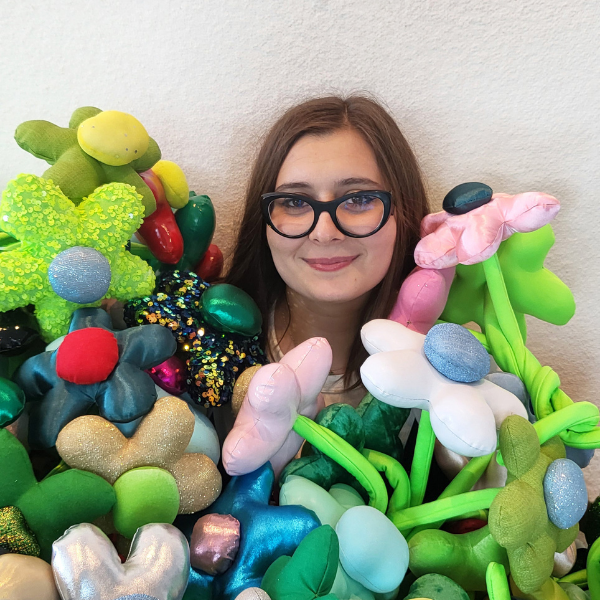
Meet Libby Evan
Libby Evan is a disabled artist, researcher, and activist. Originally from Albany, NY, she now resides in Chicago, IL. She is currently a PhD student in Disability Studies at the University of Illinois, Chicago. In 2024, she earned her MFA in Fiber and Material Studies at the School of the Art Institute of Chicago. She holds a BFA in Studio Art from Washington University in St. Louis, The Sam Fox School of Design and Visual Arts. Evan’s art practice and research focus on her experiences of having non-apparent disabilities as she breaks down the facade of being okay on the outside but not so much on the inside. Previous exhibitions include a solo show at Dietel Gallery in Troy, NY, Graduate Exhibition Two at the SAIC galleries, Voices Embodied IV and IV at the Design Museum of Chicago, The Full Light of Day at VAE in Raleigh, and Connected: VSA Emerging Young Artists Exhibition. In 2019, she was awarded an Award of Excellence for emerging young artists with disabilities at the Kennedy Center. In 2021, Evan was featured in Home Sick, an international juried exhibition in Poughkeepsie where she was awarded second prize.
What do you want to do with a DHD degree?
I plan to teach studio art through a disability studies lens, work to make artistic spaces more accessible, and curate exhibitions.
Research Interests
Disability art and culture, craft, chronic illness, chronic pain, accessible artistic spaces
Nour Ghobrial
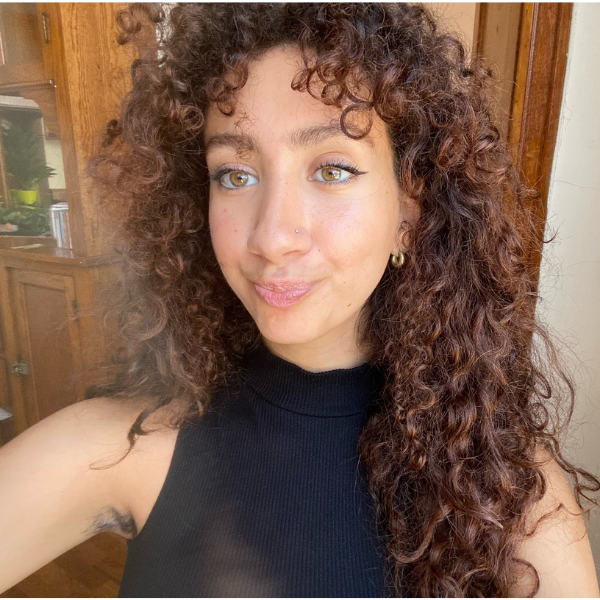
Meet Nour
Nour Adele Ghobrial (she/they) is a PhD student in Disability Studies at the University of Illinois Chicago. She received her BS in Interdisciplinary Health Sciences and Psychology from the University of Illinois Urbana-Champaign and her MS in Disability and Human Development from the University of Illinois Chicago. Nour’s research utilizes a feminist-of-color disability studies lens to explore the concept of distressed eating. In this work, they are committed to identifying and uplifting forms of care that exist beyond the medical-industrial complex.
Nour Adele Ghobrial (she/they) is a PhD student in Disability Studies at the University of Illinois Chicago. She received her BS in Interdisciplinary Health Sciences and Psychology from the University of Illinois Urbana-Champaign and her MS in Disability and Human Development from the University of Illinois Chicago. Nour’s research utilizes a feminist-of-color disability studies lens to explore the concept of distressed eating. In this work, they are committed to identifying and uplifting forms of care that exist beyond the medical-industrial complex.
What do you want to do with a DHD degree?
In the future, I hope to teach at the undergraduate or graduate level, training future scholars at the intersections of disability studies and gender and women’s studies. I am also interested in teaching future mental health care providers, with the goal of expanding access, care, and justice in the field.
Research Interests
Feminist-of-color disability studies, distressed/disordered eating, care studies, healing justice, arts-based methods.
Selected Presentations
Women’s and Gender Studies Consortium, Conference Panelist, April 2025. “Achieving Justice Through Expanding Educational and Health Opportunities.”
National Women’s Studies Association, Conference Panelist, Nov. 2024. “Reimagining Feminist Social Movements with Feminist of Color Disability Studies.”
Jennifer Jacobucci
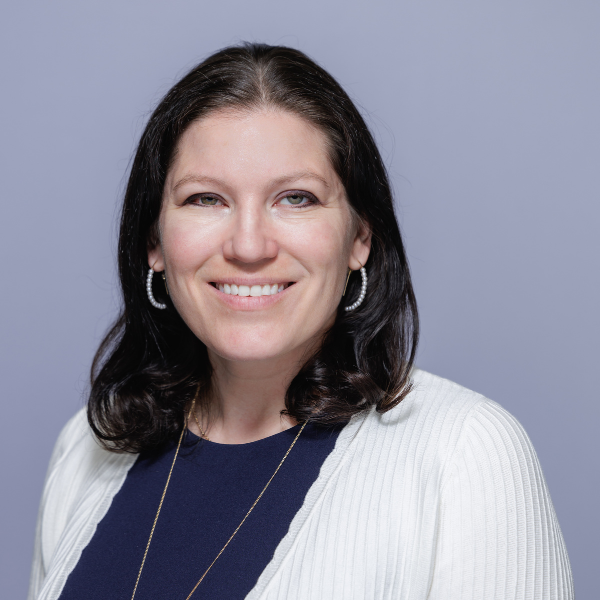
Meet Jennifer
Jennifer Jacobucci is a Clinical Assistant Professor and Executive Director of Clinical Operations at the University of Illinois College of Dentistry. She has been a dental hygienist for more than 23 years and enjoys teaching in both a clinical and classroom settings. Jennifer holds a Masters of Science in Oral Sciences and a MBA degree, both from UIC. She is currently a PhD student in Disability Studies at UIC. She sits on various hospital and infection control committees and has previously served as the chair of the Illinois State Dental Society Committee on Dental Education. Additionally, she is a Consultant Board Examiner for the CDCA-WREB-CITA licensing board.
What do you want to do with a DHD degree?
In my current role, I have witnessed the huge gap in access to dental care for patients with disabilities. My goal is to create dental curriculum for dental students and dental hygiene students. I would also like to create awareness and educational materials for practitioners in an effort to break down the barriers to care in the private practice setting.
Research Interests
Access to dental care, dentists’ perceptions/ misconceptions on treating patients with disabilities
Selected Publications
Jennifer Bereckis, Susan Rowan, Danny Hanna, Aniruddh Narvekar, Anne Koerber. Assessing Variances in Dentist’s Interpretations of Antibiotic Prophylaxis Guidelines: A Survey of Dental School Faculty, International Journal of Dentistry: January 2025, https://doi.org/10.1155/ijod/9355907
Awards and Honors
2025, UIC Chancellor’s Academic Professional Excellence Award
Shanita Jones
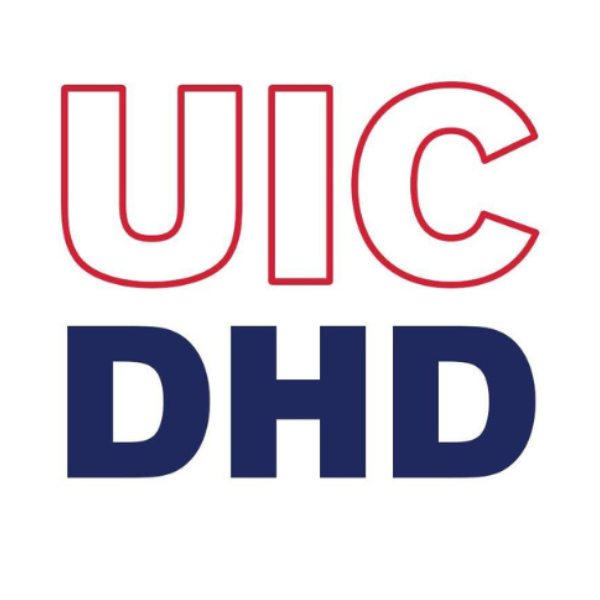
Meet Shanita
Hi! I’m Shanita, a PhD student here at UIC. I have 20+ years in the disability field, serving thousands of people with varying disabilities, certifying hundreds of professionals, and training thousands to become better equipped as direct service providers (DSPs). Serving in SPED, Occupational and Physical therapies (intern), Vocational Rehabilitation, as a Qualified Intellectual Disability Professional (QIDP), CILA and Day Program administrator, and Human Service Caseworker(HSC) for the State of Illinois DHS, I have a well-rounded view of the many intricacies that affect the lives of those living with disabilities. I have also created trainings that assist professionals in the field to seek transformative solutions that lead to a higher quality of life and a more equitable future for all people receiving various services.
Why did you choose DHD at UIC?
I chose DHD at UIC because I love the overall experience and benefits that come along with being a part of the UofI system of universities. I also find great value in having the opportunity to learn under interdisciplinary scholars who have made a major impact on the field of Disability Studies. After finishing my Master’s degree at UIC, it only made sense to remain where I felt heard, understood, and empowered to do my best work.
What do you want to do with a DHD Degree?
Due to my love for education and never-ending thirst for knowledge, I will become a university professor who will, through transformative teaching methods, equip current and future leaders to better serve others. I will use my DHD degree as the nucleus for teaching strategies that are inclusive and equitable, and that also focus on introducing the work of scholars from various backgrounds so all students feel seen in their academic careers.
Research Interests
Healthcare disparities in the Black community, the effects of exposing healthcare professionals to disability studies in informing equitable services, inclusive research techniques for the I/DD community, the Intersectionality of disability and Blackness, Dementia care and resource access in marginalized communities, Equitable and Inclusive education in academia, and Disability Justice.
Awards and Honors
IL LEND Trainee 23-24 Inclusive Education Scholars Certificate Program (IESCP) Fall 2024
Education
Bachelor of Science, Community Health: Rehabilitation and Disability Studies, University of Illinois Urbana-Champaign, 2005
Master of Science, Disability and Human Development, University of Illinois Chicago, 2024
Emilie Lacy
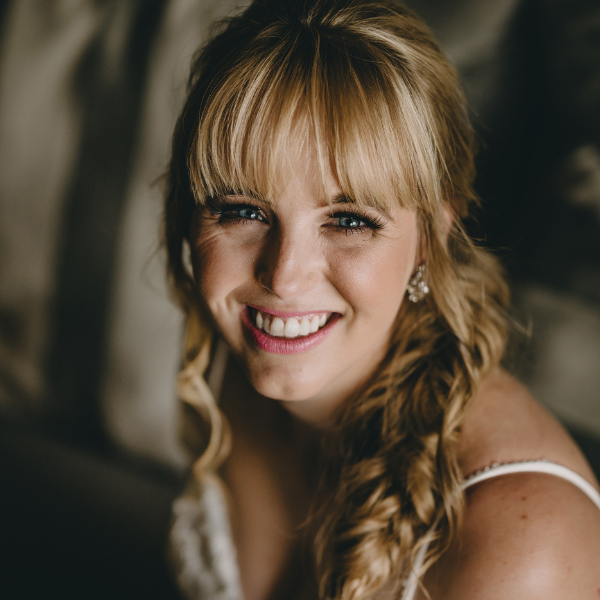
Meet Emilie
What do you want to do with a DHD degree?
My career goals aim to create a foundation of support and improve health outcomes by providing a bridge between the healthcare system and community through an educational, research-based center, enabling people with spinal cord injury to participate in society at a higher caliber.
Research Interests
Trauma, Social Support and Women’s Health Outcomes for Women with Spinal Cord Injury
Selected Presentations
Stories of Trauma among Women with Spinal Cord Injuries: The women who survived and the communities who serve them at the 2025 ACRM Conference
Awards and Honors
Chicago Area Schweitzer Fellowship 2021-2022
Christopher and Dana Reeve Foundation Quality of Life Grant in Partnership with BACKBONES 2022
Anne Hopkins Scholarship 2024
Leadership Education in Neurodevelopmental and Related Disabilities (IL LEND) graduate 2025
Charlotte A. Tate Award for Multidisciplinary Research 2025
Ky Lynch
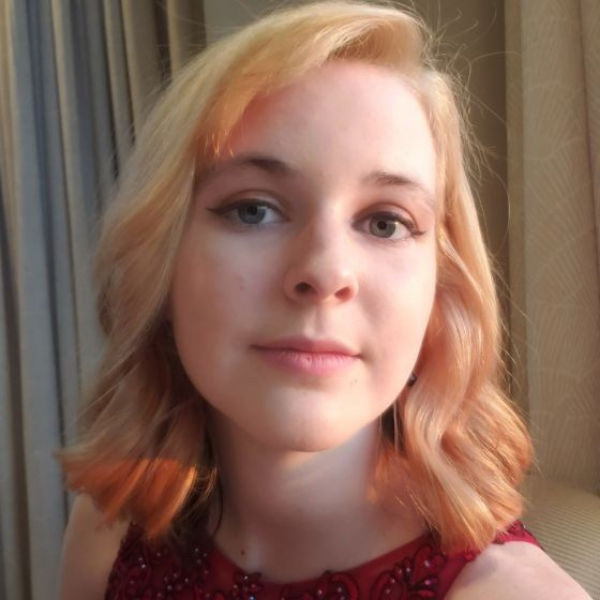
Meet Kylie
Kylie Lynch is a first-year Ph.D. student at the University of Illinois- Chicago. Her background is in clinical psychology (M.S. from East Texas A&M University) and 17th century English literature (M.A. from the University of Virginia). Her work focuses on the medical humanities, with a specific eye towards the porous boundary that separates disorder and disability, and how we might trace the root of this separation through changes in philosophical understandings of humanity. Previously, Kylie worked predominantly in psychological research labs, including the RISE lab at the University of Virginia and the Social Research Laboratory at East Texas A&M University. There, she published social psychology research detailing the effects that intersecting identities have on perceptions of the self and others. You can follow Kylie’s work on her LinkedIn page.
What do you want to do with a DHD degree?
I would like to work towards building a stronger coalition among disabled communities and disordered communities. Ideally, I’d like to pursue this goal through educating psychologists and disability scholars about the continuities across these identities as a professor, although I am open to working outside of academia as well.
Research Interests
My research interests include theory of mind, Enlightenment literature, and clinical narratives about mental health and disorder. I am also interested in the history of diagnostic criteria in the DSM, and the research/working groups that generate these criteria.
Selected Presentations
Lynch, K. (2024). Romantic Disability and The Question of Representation: Understanding Disability-as-Epiphany in Wordsworth’s Lyrical Ballads. [Conference presentation]. MPCA 2024 Convention, Chicago, IL, United States.
Selected Publications
Debnam, K. J., Avery, L. R., & Lynch, K. (2025). More Than a Woman: A Scoping Review of the Role of the Strong Black Woman Schema in Black Women’s Romantic Relationships. Trauma, Violence, & Abuse, 0(0). https://doi.org/10.1177/15248380241308881
Lynch, K., Reysen, S., Katzarska-Miller, I., & Rose, A. (2025). Predicting the global citizenship identification model using the global citizenry scale. Peace and Conflict: Journal of Peace Psychology. Advance online publication. https://doi.org/10.1037/pac0000818
Awards and Honors
Research Excellence in a Psychology Laboratory, University of Virginia 2023
Jeffrey L. Reider & Charles F. Otis Endowed Prize, UVa Queer Alumni Network, 2022 & 2023
Piyush Mishra
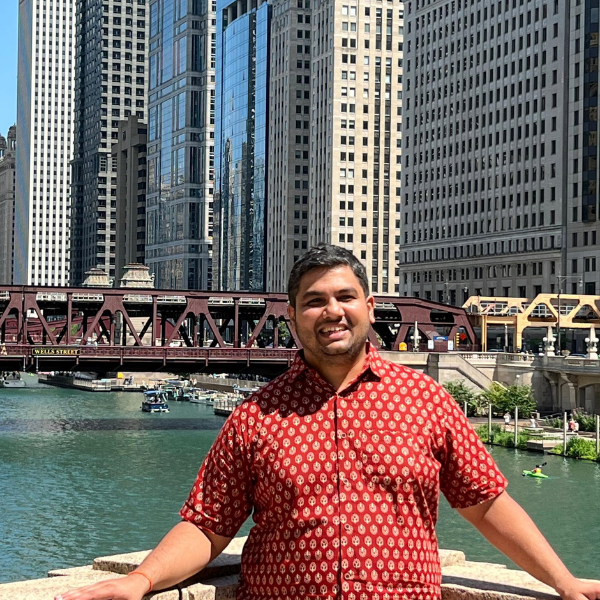
Meet Piyush
I am an interdisciplinary researcher in disability studies, program developer, and storyteller with a background in engineering, working at the intersection of systems and narratives. Currently a PhD candidate in Disability Studies at the University of Illinois Chicago (UIC), my work is grounded in personal experience as a sibling of a brother who is autistic and intellectually disabled, and extends into professional practice spanning policy, training, research, and creative expression.
My focus areas include housing, caregiving, and future planning for adults with intellectual and developmental disabilities (IDD). I have led and contributed to initiatives such as Virtual Future is Now, co-developing and facilitating training programs for adults with IDD and their families across multiple U.S. states, and Saarthi, India’s first sibling-led support community.
I believe in the power of research, advocacy, and art to bridge communities, foster empathy, and drive systemic change. My approach integrates participatory methods, cross-sector partnerships, and knowledge translation across academic, policy, and creative platforms to advance inclusive disability futures and infrastructures of care.
What do you want to do with a DHD degree?
Earning a PhD in Disability Studies will equip me to work at the intersection of research, policy, and practice. My goal is to utilize my training to advance disability futures by creating inclusive housing and caregiving systems, developing digital and community-based resources, and contributing to disability policy and advocacy on an international scale. Whether through academia, NGOs, or collaborative partnerships, my long-term vision is to strengthen infrastructures of care and foster sustainable futures for individuals with intellectual and developmental disabilities and their families.
Research Interests
Intellectual and Developmental Disabilities, Future Planning, Housing, Aging, Caregivers’ Support, Community Systems Design, Sibling Advocacy, Health Promotion, Leisure and Recreation, Disability Arts and Culture
Selected Presentations
Mishra P., Paul P., Acevedo J.C., & Labbé D. (2026, Jan). Everybody Moves: A Policy Scan of Disability and Diversity in Leisure. Illinois Association of Park Districts (IAPD) / Illinois Park and Recreation Association (IPRA) Soaring to New Heights Conference 2026, Chicago.
P. Mishra and D. Labbé (2024). Environmental Scan of out-of-home housing options for adults with intellectual and developmental disabilities in India, IASSIDD 2024, Journal of Intellectual Disability Research, 68: 641-890. https://doi.org/10.1111/jir.13166
K.Arnold, T.Heller, K.Hsieh, J.Caldwell, J.J.Pak, T.Gordon, P.Mishra (2024), Virtual Future is Now: An online future planning curriculum for adults with intellectual and developmental disabilities and their families, IASSIDD 2024, Journal of Intellectual Disability Research, 68: 641-890. https://doi.org/10.1111/jir.13166
Awards and Honors
2025 Award for Graduate Research, Graduate College, UIC, Chicago (USD 2495)
2024 Global Albrecht Disability Award, UIC Albrecht Global Disability Impact Fund (USD 2000)
2024 Ann Edward and Page-El Scholarship Award, Department of Disability and Human Development, UIC, Chicago (USD 500)
2023 Carlos Drazen Memorial Research Fund Award, Department of Disability and Human Development, UIC, Chicago (USD 1000)
Carly Naughton
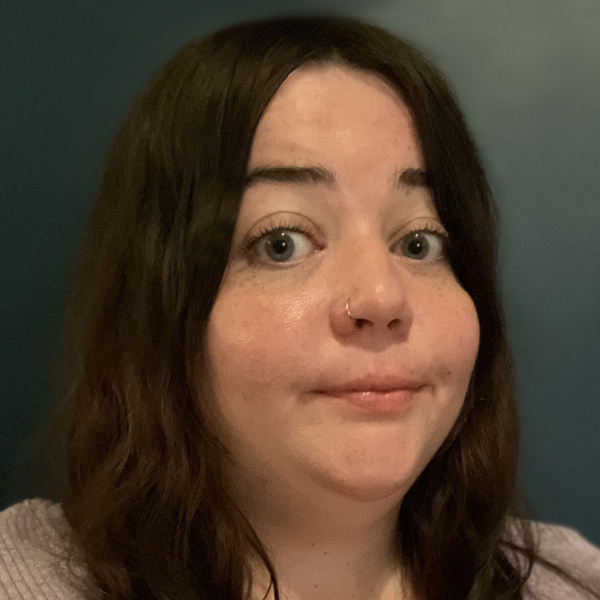
Meet Carly
Carly Naughton is a disabled research based artist and scholar. She is currently a PhD student in Disability Studies at the University of Illinois at Chicago. In 2021, Carly earned her MFA in Visual Studies and MA in Critical Studies through the dual-degree program at the Pacific Northwest College of Art in Portland, Oregon. Carly’s academic practice focus on applying a interdisciplinary critical social theory perspective to medical history and disability history.
What do you want to do with a DHD degree?
Carly hopes to teach disability studies and disability history, continue to do archival research, and/or work in disability culture.
Research Interests
Carly’s research interests include disability and medical history in the United States from a critical social theory perspective, the role of children in eugenics in the late 19th and early 20th century, reproductive justice, disability arts, and crip pedagogies.
Selected Presentations
Naughton, Carly. “My Body is Not a Metaphor: Art, Disability, and Objectification” Lecture,
Hampshire College Humanities, Arts, and Cultural Studies Symposium, Amherst, 2017.
Naughton, Carly. “Eugenic Assemblages: Race, Disability, and Reconceptualizing Eugenics Through Assemblage Theory” Lecture, Pacific Northwest College of Arts, Portland, 2021.
Naughton, Carly. “Sick Pleasures” Lecture, Pacific Northwest College of Arts, Portland, 2021.
Awards and Honors
2021 Thesis Writing Award in Critical Studies at the Pacific Northwest College of Art.
2017 David Smith Endowment for American Studies, Hampshire College.
Mahvish Nazar

Meet Mahvish
A Muslim, disabled woman of color interested in learning what disability means individually for herself and collectively as a community.
Why did you choose DHD at UIC?
DHD at UIC is one of the few programs in the country which does intersectional work around disability and draws candidates from various concentrations and fields which made me choose it. I look forward to learning from my peers and enriching my educational journey with this chosen community.
What do you want to do with a DHD degree?
I eventually wish to work as an activist scholar in spaces where advocacy is informed by pedagogy and vice versa.
Research Interests
Intersection of disability and gender in the context of South Asia, with a focus on advocacy.
Education
MSc in Cultural Foundations of Education, Syracuse University, 2020
Bri Noonan
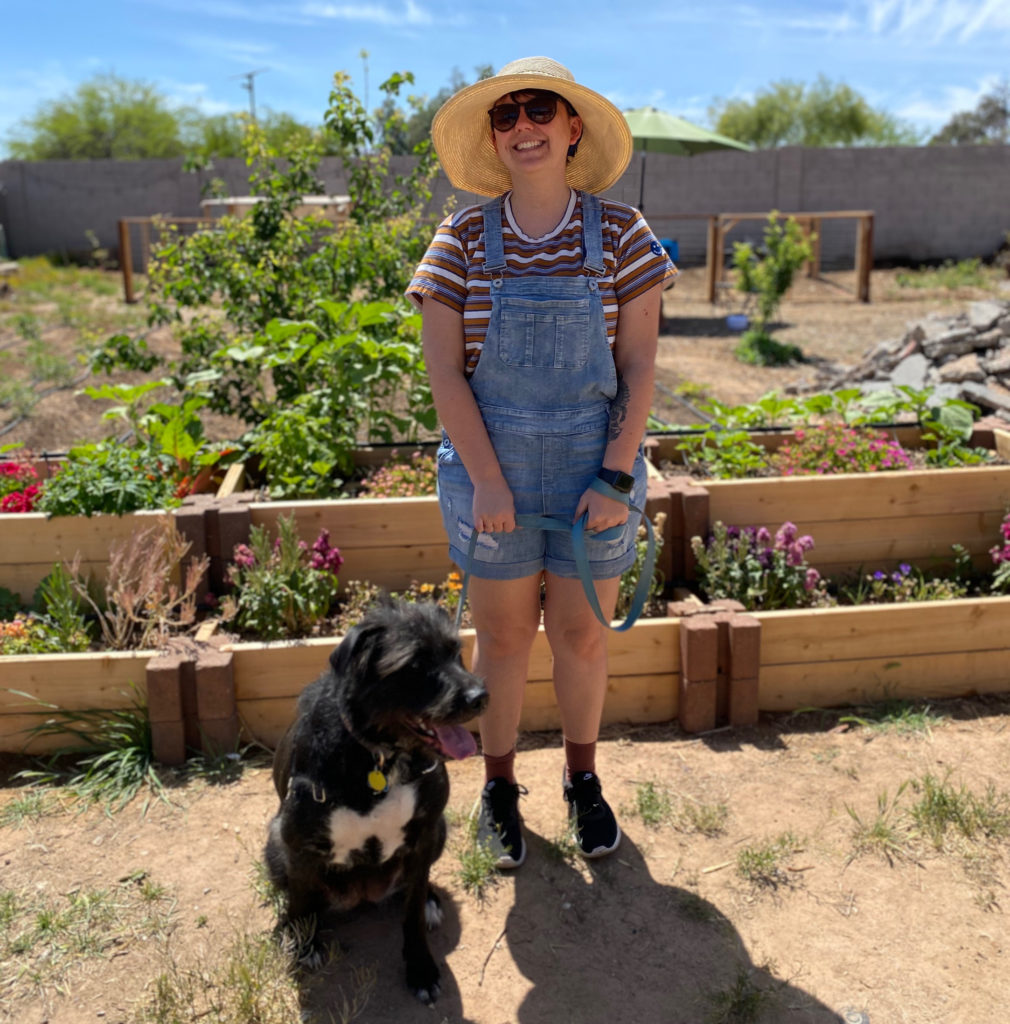
Meet Bri
Hello! I am Bri, and I grew up primarily in Phoenix, Arizona, and moved to Chicago, IL, to pursue my PhD. I am a queer, disabled scholar-artist and a dog parent to Fable (a cute lab/wolfhound). Some fun facts about me are that I enjoy reading queer romance novels and watching many different types of media (except horror). I am interested in hacking access and care in unsustainable systems and always continuing to learn from one another. Feel free to reach out if you think we have similar interests!
What do you want to do with a DHD degree?
I hope to utilize my DHD degree to work in a non-profit, academic, and/or other spaces focused on disability arts and culture with an emphasis on LGBTQ+ communities.
Research Interests
My research explores disability and queerness in conversation with crip and queer theory, often utilizing artistic and media narratives along with personal narrative to investigate queer disabled ways of knowing and lineages.
Selected Presentations
Noonan, B. (2025, October). Utopic disruption: Star Trek, disability, eugenics, & memory [Conference paper]. Midwest Popular Culture Association / American Culture Association Conference, Iowa City, IA
Noonan, B. (Organizer & Facilitator). (2025, April). Access as praxis: A conversation between disability arts and culture practitioners [Roundtable discussion]. 4th Annual Symposium for Disability and Accessibility, Yale University, New Haven, CT.
Noonan, B. (Co-facilitator). (2025, April). Cripistemological poetics: Capturing our ingenious ways of being and becoming [Workshop]. Women and Gender Studies Consortium: Embodying Feminism: Calling In, Calling Out, Calling to Action, Madison, WI.
Selected Publications: Noonan, B. (2025). Voices embodied: Reverberations. Bodies of Work, University of Illinois, Chicago.
Kattari, S. K., Noonan, B., & Lacey, E. Z. (2024). Exploring a methodology of care: Creating research with disabled queer individuals and community. In Exploring sexuality and disability: A guide for human service professionals. essay, Routledge.
Awards and Honors
Ethel Louise Armstrong Endowed PhD Fellowship, Fall 2023 – August 2025
Barnhurst-Doherty Award, Spring 2025
Graduate Student Council Award, Spring 2025
Institute for Disability and Human Development Research Award, Spring 2025
Institute for Disability and Human Development Research Award, Spring 2024
Jumpstart Research Grant, Arizona State University, Spring 2021
Katie O’Neill
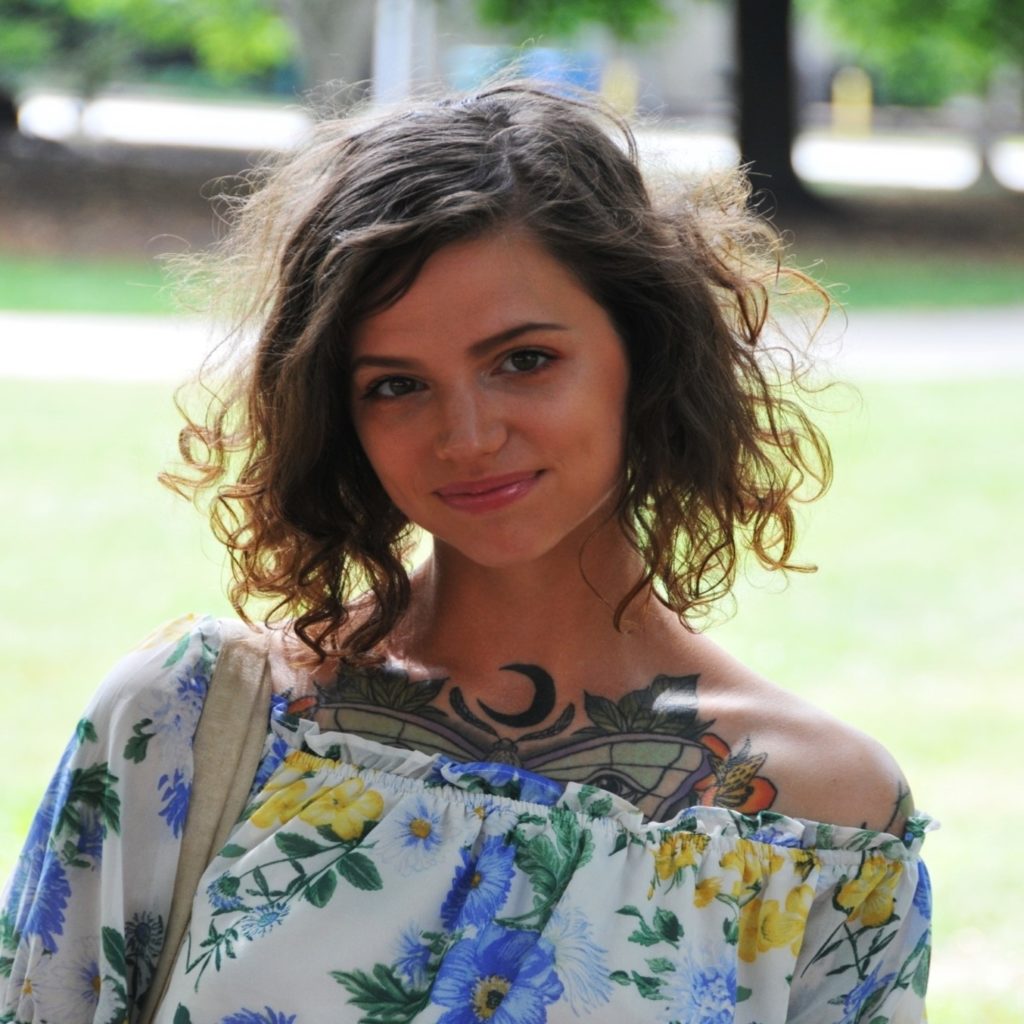
Meet Katie
Hi! I’m Katie. I hail from New Jersey and moved to Chicago in 2017 to begin my MFA in Performance at the School of the Art Institute of Chicago. I am a proud Mad woman, and my lived experiences with Schizophrenia and Borderline Personality Disorder inform my creative and research practices. As a crip performance artist & choreographer, I collaborate exclusively with disabled participants to create performances that critically engage with topics such as “passing” as non-disabled, sanism, childhood madness, and compulsory able-bodiedness. I would identify myself as a film buff, quintessential Piscean, and giggle machine. I also enjoy meeting new people so don’t be shy!
Why did you choose DHD at UIC?
I was at first drawn to this program because of its tight-knit community and its emphasis on interdisciplinarity. Coming from six years of art school, I was eager to hone in on disability research in an academic program invested in enriching disability education. I believe that my education at DHD will strengthen my artistic practice and better situate it in disability arts/culture. I’m excited for the many years ahead.
What do you want to do with a DHD degree?
Post-DHD, I plan to create a sustainable community center where people diagnosed and undiagnosed may access movement-based forms of communal care, and to be a professor in Disability/Mad Studies somewhere in the world!
Education
MFA, Performance, School of the Art Institute of Chicago, 2019 BFA, Fine Arts, minor in Art History, Moore College of Art & Design, 2017
Corbin Outlaw
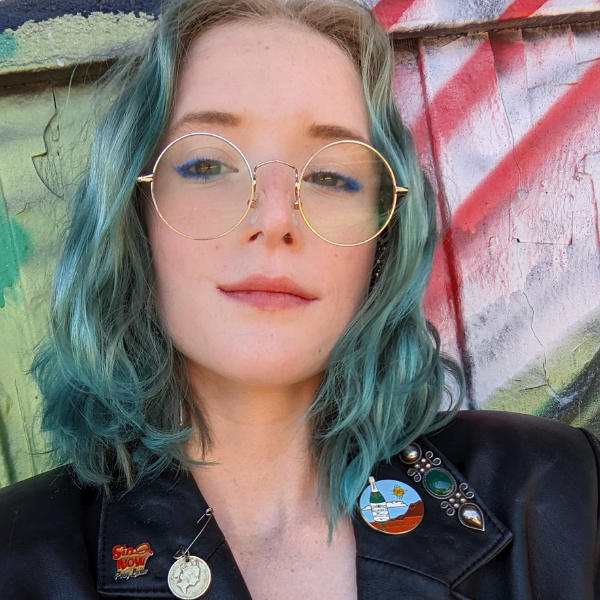
Meet Corbin
What do you want to do with a DHD degree?
I want to teach in higher education, while publishing research that explores new ways to think about pain and chronic illness, looking to literary representations as one of many potential avenues to do so.
Research Interests
Pain studies, Literary Disability Studies, Disability Arts and Culture, Queer Crip Theory
Selected Presentations
“Using Plain Language Summaries in a Large Enrollment Online Disability Studies College Course” Summit of Teaching and Learning, September 18th, 2025.
Crip Pandemic Conversations, Chicago IL. 2023
Crip Pandemic Life: Accessible Publishing Workshop, February 13th, 2023.
Selected Publications
Alyson Patsavas, Theodora Danylevich, Margaret Fink, Aimi Hamraie, Mimi Khúc, Sandie Yi, and Corbin Outlaw, “Crip Pandemic Conversation: Textures, Tools, and Recipes,” Lateral special issue 11(2). https://doi.org/10.25158/L11.2.6
Awards and Honors
UIC Graduate College University Fellow
Hope Sparks

Meet Hope
I use she/her pronouns. I’m a Floridian and completed both my BA and MS in Psychology in Florida. My older sister Sara has Down syndrome, and that spurred my interest in disability studies. I’m a current RA for LEND. I love podcasts, baking, and my two pet bunnies!
Minor Program
Disability Legal Certificate
Why did you choose DHD at UIC?
The research coming out of the DHD department is so important and I wanted to be a part of the work and learn from the experts, and it’s the only Disability Studies Ph.D. in the country!
What do you want to do with a DHD degree?
My end goal is working in either a non-profit, academic, or policy-related field focusing on federal advocacy for families!
Research Interests
Federal policy focused on guardianship and supported decision making. Family member advocacy and support.
Selected Publications
Sparks, Hope Marie, “The Influence of Autism Spectrum Disorder Disclosure on Peer Social Distancing in Higher Education” (2021). UNF Graduate Theses and Dissertations. 1079. https://digitalcommons.unf.edu/etd/1079
Education
Masters of Science, Psychological Sciences, University of North Florida, 2021. Bachelors of Arts, Liberal Arts with a focus in Psychology, New College of Florida, 2019.
Washieka Tenieka Torres
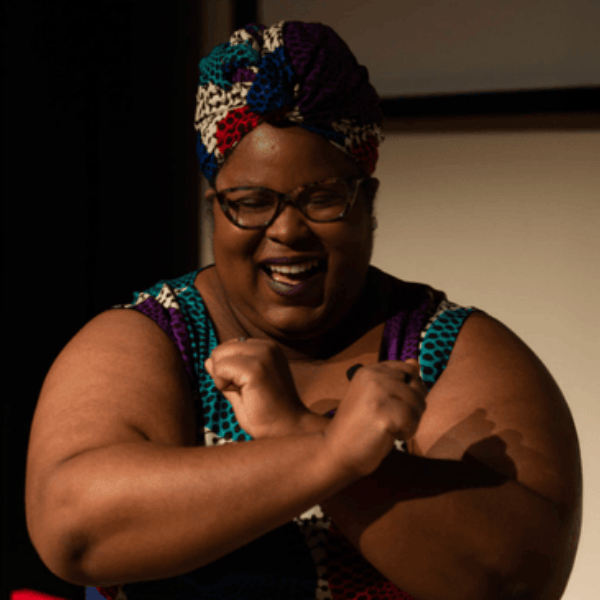
Meet Washieka
I am a disability rights scholar, activist, and documentarian. I am from the South Bronx in New York City.
Why did you choose DHD at UIC?
I like the interdisciplinary approach to the field of Disability Studies and I like that I can work with Professors with different education backgrounds.
What do you want to do with a DHD degree?
I want to work as an administrator while continuing to work on creative projects with people with disabilities in order to create equitable media. I also want to explore the way we look at food and food access for marginalized communities.
Research Interests
Foodways Activism in the Academy Community Outreach
Selected Presentations
“The Bonds We Build Can Change the World.” TEDxBGSU, April 2018.
“Beyond Comfort, Beyond the Familiar: how forging new paths with quantitative and qualitative data can be done.” University of Toledo, Toledo, Ohio, February 2018.
Awards and Honors
Abraham Lincoln Fellowship, University of Illinois Chicago, 2018
Dr. Antonio Buron Scholarship, Bowling Green State University, 2016
Winifred O. Stone and Presidential Graduate Scholarship for Diversity Enhancement, Bowling Green State University, 2015
Jaimee VanAssche
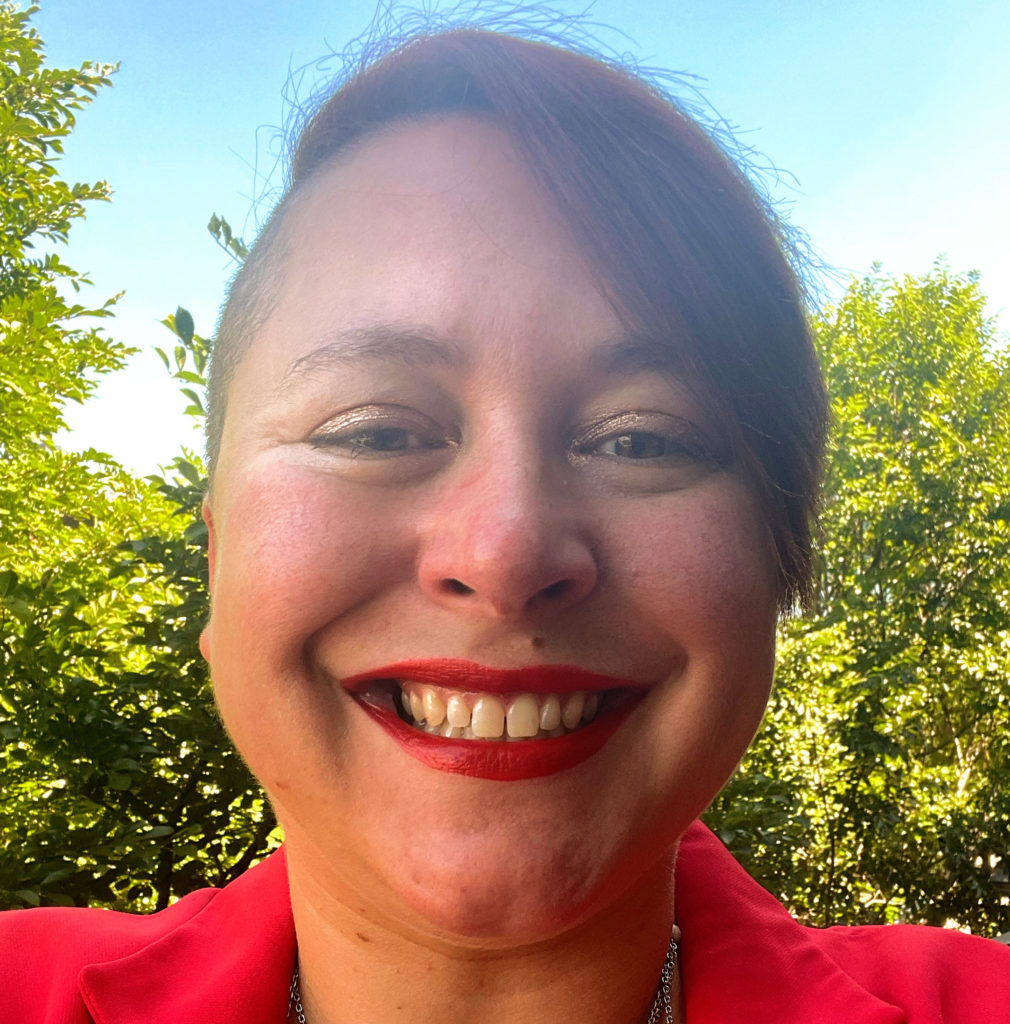
Meet Jaimee
Why did you choose DHD at UIC?
I chose to attend UIC for my PhD in Disability Studies because of their commitment to social justice and the opportunity for experiential learning, research, and networking through their many research centers, clinics, and community-based programs.
What do you want to do with a DHD degree?
I would eventually like to work in academia, ideally at a University Center for Excellence in Disability, performing community-based action research in disability studies and further developing new and existing programs based on research findings.
Research Interests
My research interests are comparing attitudes, policies, and programming for people with disabilities in the United States with those in other countries.
Education
BA in Education, Elementary Education, Michigan State University, 2008; MS in Outdoor and Environmental Education; Alaska Pacific University, 2011; MEd in Special Education, University of Nevada – Reno, 2015
Kevin Hans Waitkuweit
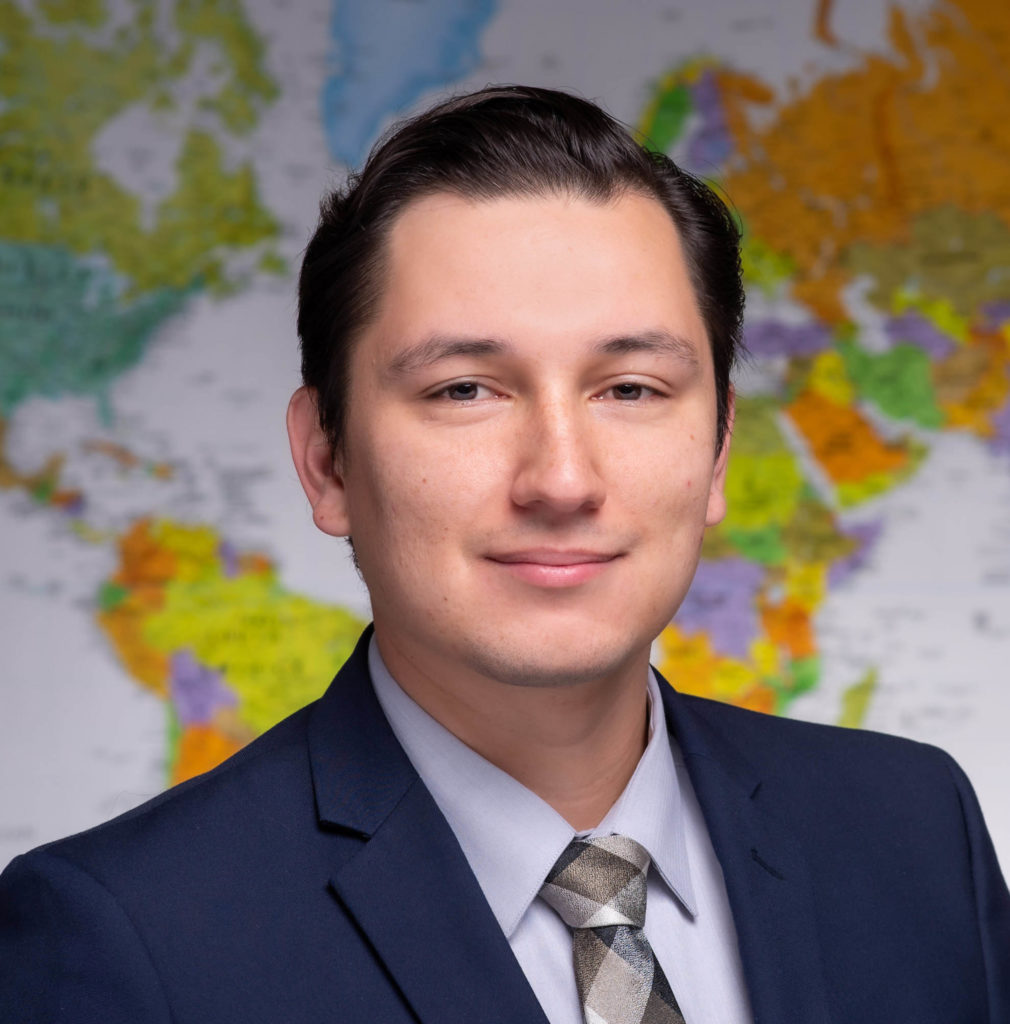
Meet Kevin
Kevin Hans Waitkuweit is a PhD student in the Department of Disability and Human Development. He received two AAs (French and Mathematics) from Los Angeles Valley College, a BA in History with minors in Chicana/o Studies, Disability Studies, and Public Affairs from UCLA, and a MA in Sociology from the University of Notre Dame. His research interests focus on the social impact of medical phenomena, with particular attention to meaning-making process. Waitkuweit’s research can be found in publications such as Research in Social Science and Disability, the Journal on Migration and Human Security, the Journal of Language and Politics, Context, and Development in Practice. Waitkuweit also serves as an adjunct faculty member in Southwestern Michigan College’s Social Sciences Department, where he teaches introductory sociology courses.
What do you want to do with a DHD degree?
As a social science researcher interested in the social impact of medical phenomena understanding the disabled experience is a critical factor. My research interests focus on how disability is defined across various groups, organizations, and individuals. DHD at UIC offers a unique opportunity to explore questions of the social impact of medical phenomena in an interdisciplinary environment.
Research Interests
Disability Studies, Social Theory, Cultural Sociology, Cultural Anthropology, Medical Sociology, Medical Anthropology, Mixed-Methods
Selected Presentations
Waitkuweit, K.H., (2025). “On Death and Dying in American Medicine: A Quantitative Content Analysis of the AMA’s Proceedings.” Roundtable presentation. 120th Meeting of the American Sociological Association, Chicago, Illinois.
Waitkuweit, K.H., 2024. “Phenomenology, Embodiment, and Hate: An Analysis of US Disability-Related Hate Crimes from 2003 to 2021.” Roundtable presentation. 119th Meeting of the American Sociological Association, Montreal, Québec, Canada.
Waitkuweit, K.H. (2023). “The Meaning of Disability and Family: A Critical Content Analysis of the AMA’s Proceedings.” Roundtable presentation. 118th Meeting of the American Sociological Association, Philadelphia, Pennsylvania.
Selected Publications
Hare, T., Rivero Fuentes, M. E., & Waitkuweit, K. H. (2025). Defining, Measuring, and Increasing “Rootedness” in the High Migration Context of Honduras. Journal on Migration and Human Security, 13(1). https://doi.org/10.1177/23315024241259768
Waitkuweit, K.H. (2024). “The Meaning of Disability and Family in American Medicine: A Content Analysis of the Intersection of Disability and Family in the AMA’s Proceedings from 1846 to 2022.” Disability and the Changing Context of Family and Personal Relationships (Research in Social Science and Disability, Vol. 15), Emerald Group Publishing Limited, Bingley.
Waitkuweit, K.H. (2023). Teaching international development: a proposal for consolidating practitioner and academic training resources, Development in Practice, 33(6), 736-741, DOI: 10.1080/09614524.2023.2179566
Awards and Honors
2025 – IDHD Student Research Award, UIC 2025 – UIC Student Presenters Award Travel Scholarship
2024 – Quarter 2 Graduate Student Council Travel Award, UIC
2023-2024 – Applied Health Sciences Scholarship Award, UIC
2023 – Travel Award, American Sociological Association
2022 – Infrastructure and Services Award, Lucy Family Institute for Data and Society
2022 – Research Impact Award, Pulte Institute for Global Development
2022 – National Coalition of Independent Scholars, Conference Support Grant
Chelsea Wallaert
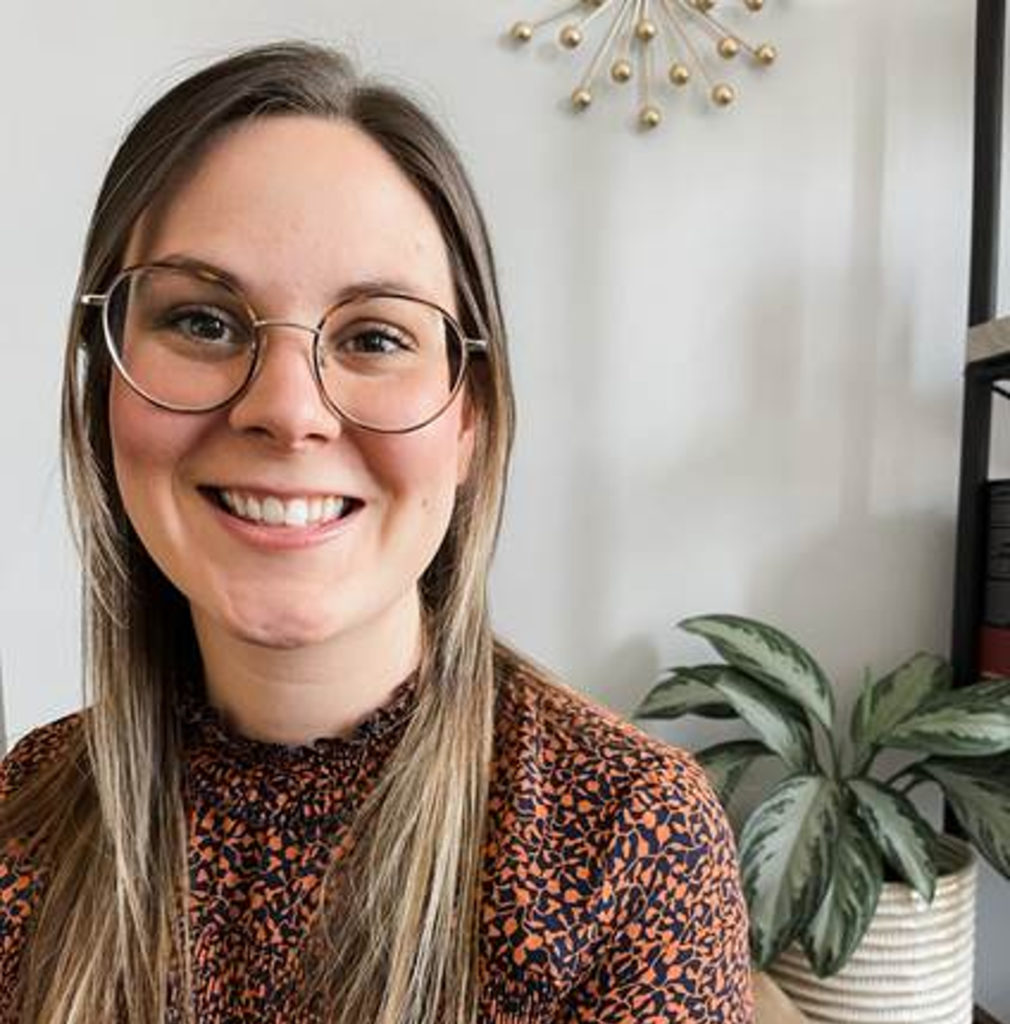
Meet Chelsea
Hi, I am Chelsea (she/her) and I am a pediatric occupational therapist with professional experience in the early intervention program throughout the Chicagoland area. I was also a trainee in the The Illinois Leadership Education in Neurodevelopmental and Related Disabilities (LEND) program during the 2020/2021 academic school year. Through my applied clinical work in addition to my continued education and training, I have gained a strong interest and passion in working in collaborative and interdisciplinary contexts with an aim of providing children with disabilities and their families with more equitable and positive early childhood experiences.
Why did you choose DHD at UIC?
The collaborative approach the Disability Studies Program at UIC takes with community members and partners in addition to the interdisciplinary faculty was a big factor in my decision to choose this program. Furthermore, as an occupational therapist who aims to utilize Disability Studies theory and principles to inform more inclusive and anti-ableist practices within pediatric therapeutic settings, I value the relationship between the Disability Studies Program and Occupational Therapy Department.
What do you want to do with a DHD degree?
After completing my PhD in Disability Studies, I intend to teach in an Occupational Therapy Program while continuing to engage in research in collaboration with families with disabled children. The ultimate goal for my future work is to add to the existing movement and work around creating a more just and inclusive society for children with disabilities and their families.
Research Interests
Early Childhood Disability, Family Perceptions of Disability, Family Resilience, Early Intervention, Pediatric Systems of Care, Inclusive Early Childhood Experiences, Medical & Therapeutic Reports and Ableist Language, Dis/ability Critical Race Studies (DisCrit), Community-Based Participatory Action Research.
Education
OTD, Washington University in St. Louis, 2018; BA, Psychology, Augustana College, 2016
Fletcher Weiss
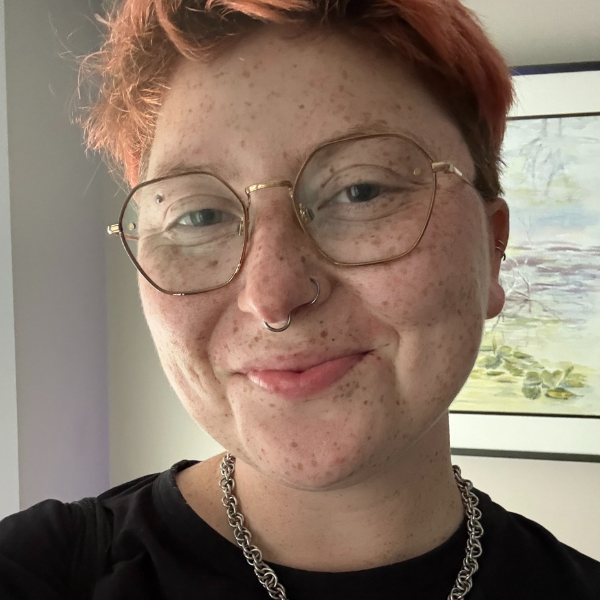
Meet Fletcher
Hi, I’m Fletcher (they/them)! I am in the PhD program in Disability Studies here at UIC. My background is in English, Theatre, and Teaching. My MA in English with a Teaching Certificate is from Georgetown University, and my BA in English with honors is from Lewis & Clark College. My research focuses on queer/trans and disability representation in speculative fiction, and I am particularly interested in examining queer/transcrip embodiment and theorizations of transcrip time in speculative narratives. I love to read, bake, and play with my two cats, Mabel and Dandelion. You can find me at your local bookstore, vegan bakery, or swimming in Lake Michigan.
What do you want to do with a DHD degree?
I hope to pursue an academic or nonprofit based job involving disability and queerness. I love working with students and hope to work directly with students in some capacity in the future.
Research Interests
My research interests are in intersections of queerness, trans studies, disability, gender, and race in speculative fiction. I am also interested in transcrip theory, queer/crip theory, crip time, and disability metaphor.
Selected Presentations
Weiss, Fletcher. “Speculative Disability Knowledge, Survival, and Queer Crip Hope in Wilder Girls.” Midwest Popular Cultura Association/American Culture Association Annual Conference, October 3 – 5, 2025, Iowa City, IA.
Weiss, Fletcher. “Race, Gender, Disability, and Speculative Embodiment in Rivers Solomon’s Sorrowland.” 2025 Women’s and Gender Studies Consortium Conference, April 10 – 12, 2025, Madison, WI.
Weiss, Fletcher. “Intersectional Crip Utopia in Octavia Butler’s Parable of the Sower & Parable of the Talents.” Southwest Popular and American Culture Association Conference, February 20 – 22, 2025, Albuquerque, NM.
Awards and Honors
Anne Hopkins Scholarship, Spring 2025
Elena M. Zavos Isotita Scholarship, Spring 2025
SWPACA Graduate Student Paper Award, Identities & Cultures, Spring 2025
Sarah M. Williams
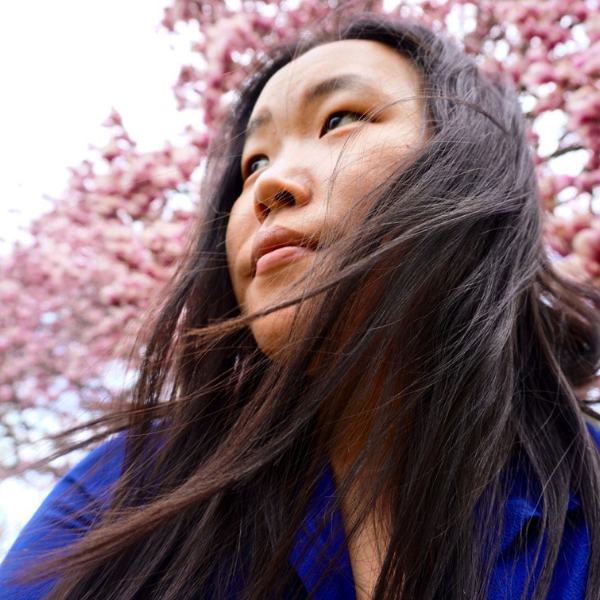
Meet Sarah
Sarah Kim-Williams is a Ph.D. candidate in Disability Studies with a concentration in Gender and Women’s Studies at the University of Illinois Chicago. Her research emerges at the intersections of Asian American Studies and Feminist Disability Studies. She is currently writing her dissertation, in which she examines how Korean diasporic writers and filmmakers utilize representations of disability to critique histories of transnational adoption. Sarah’s work has been supported by the Center for Black, Brown, and Queer Studies (BBQ+), where she is a 2025-2026 Academic Fellow.
What do you want to do with a DHD degree?
One of my goals is to pursue a tenure-track position in academia, either in an Asian American Studies program or a Gender and Women’s Studies program.
Research Interests
Korean adoption, redress culture, representations of illness in Asian American literature
Selected Presentations
“Palimpsests of Disability in Deann Borshay Liem’s First Person Plural,” Pacific Ancient Modern Language Association, Asian American Literary and Cultural Studies Section, 2025.
“Crip Kinship in Kogonada’s After Yang,” National Women’s Studies Association, Feminist of Color Disability Studies section, 2024.
Awards and Honors
Master’s/Early Doctoral Academic Fellowship, The Center for Black, Brown, and Queer Studies (BBQ+), $2,000, 2025.
Covid and Higher Education Grant, American Association of People with Disabilities, shared Co-PI, $10,000, 2025.
Provost’s Graduate Internship Award, University of Illinois Chicago, $5,000, 2023.
Cassandra Winters

Meet Cassandra
Why did you choose DHD at UIC?
I was attracted to the interdisciplinary nature of the DHD program. After practicing as an occupational therapy clinician for over 10 years in hospitals, schools and home care environments, I was ready to expand my perspective and dive into what disability means through a broader cultural, political, and social justice lens.
What do you want to do with a DHD degree?
I am interested in policy change, research and academia. I am also interested in exploring how my training in disability studies will influence my clinical practice and approach as an occupational therapist.
Research Interests
Long-term cancer survivorship, mothers with disabilities, ethical issues in disability scholarship.
Selected Presentations
Winters, C., Marshall H., Magasi, S. (2022, June, 16-18). Exploring the needs of long-term cancer survivors through the COPM. Poster session presented at The Occupational Therapy Summit of Scholars. Madison, WI. Marshall H., Winters, C., Magasi, S. (2022, April 29). Exploring the needs of long-term cancer survivors through the COPM. Poster session presented at the Annual Dr. Gary Kruh Cancer Research Symposium. University of Illinois. Chicago, Illinois.
Selected Publications
Magasi, S., Marshall, H. K., Winters, C., & Victorson, D. (2022). Cancer Survivors’ Disability Experiences and Identities: A Qualitative Exploration to Advance Cancer Equity. International journal of environmental research and public health, 19(5), 3112. https://doi.org/10.3390/ijerph19053112
Awards and Honors
Leadership Education in Neurodevelopmental Disabilities (LEND) fellowship (2022-2023)
Education
Bachelor of Arts with Distinction in Psychology (2005); Master of Occupational Therapy (2011) The Ohio State University
Daryl Patrick Yao
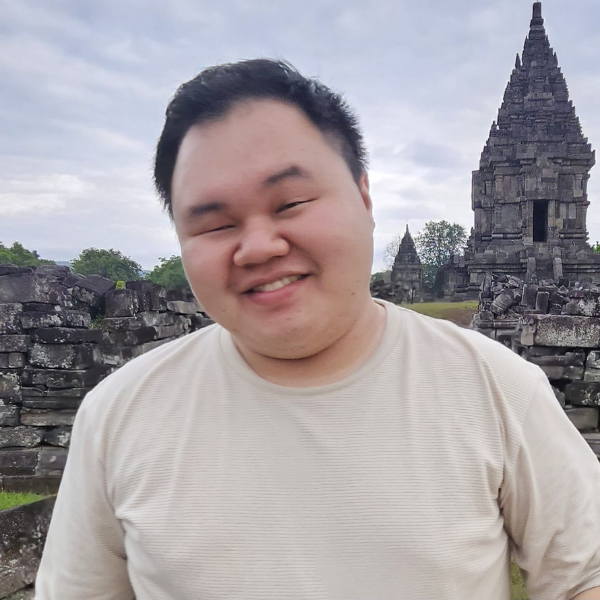
Meet Daryl
Daryl Patrick Gamboa Yao (he/him/his) is a Chinese-Filipino scholar from Cebu, Philippines. Before beginning his doctoral studies, he worked as an occupational therapist in a government tertiary hospital, serving underserved and indigent persons with disabilities. Both his professional practice and his close personal ties—including a cousin with cerebral palsy whom he treats like a sister—have deeply influenced his commitment to advancing disability rights and inclusion. Through his journey in UIC’s Disability Studies PhD program, Daryl has also reclaimed his disabled identity, which has further deepened his resolve to confront ableism and push for societal transformation. His work bridges his clinical background, critical scholarship, and personal commitments, always aiming to challenge injustice and build more inclusive futures.
What do you want to do with a DHD degree?
I aspire to work in academia, conducting research that offers solutions to real-world problems while challenging dominant narratives about disability and health, especially within marginalized communities. Through critical, community-engaged scholarship, I want to disrupt societal norms that perpetuate injustice and contribute to advancing disability justice globally–where disabled people are not only included but lead change.
Research Interests
My research broadly focuses on disability rights and justice, particularly within the context of the Global South. My dissertation examines how disability policies in the Philippines align—or fail to align—with the UN Convention on the Rights of Persons with Disabilities (CRPD), and how these frameworks shape the everyday lives of disabled people. My master’s thesis highlighted that access and opportunities are profoundly shaped by cultural, political, and policy contexts—factors that extend far beyond the reach of assistive technology. Across my projects, I aim to illuminate how structures of power and policy both enable and constrain participation, while also centering the voices and leadership of disabled people themselves.
Selected Presentations
Yao, D.P.G., Sy, M.P., Martinez, P.G.V., & Laboy, E.C. (2022 August 18-20). Is Occupational Therapy an Ableist Health Profession [Oral presentation]? Inaugural World Occupational Science Conference, Vancouver, Canada
Selected Publications
Yao, D.P.G., Sy, M.P., Martinez, P.G.V., & Laboy, E.C. (2022). Is occupational therapy an ableist health profession? A critical reflection on ableism and occupational therapy. Cadernos Brasileiros de Terapia Ocupacional, 30, e3303, https://doi.org/10.1590/2526-8910.ctoRE252733032
Yao, D.P.G., Bontje, P., Inoue K., Tanaka, A., & Lacsamana-Manalaysay, J. (2021). Coping with bereavement: The experience of a Filipino who lives life using a wheelchair. World Federation of Occupational Therapists Bulletin, 77(1), 58-64. https://doi.org/10.1080/14473828.2020.1868164
Yao, D.P.G., Inoue K., Sy, M.P., Bontje, P., Suyama, N., Yatsu, C., Perez, D.A., & Ito, Y. (2020). Experience of Filipinos with spinal cord injury in the use of assistive technology: An occupational justice perspective. Occupational Therapy International, 2020, Article 6696296. https://doi.org/10.1155/2020/6696296
Awards and Honors
2025 Anne Hopkins Scholarship Award
2024 Albrecht Global Disability Award
2024 Carlos Drazen Memorial Scholarship Award
2023 Charlotte Tate Multidisciplinary Research Award
2019 Asian Human Resource Development Project for Medical Professionals Scholarship
Claire Zuch
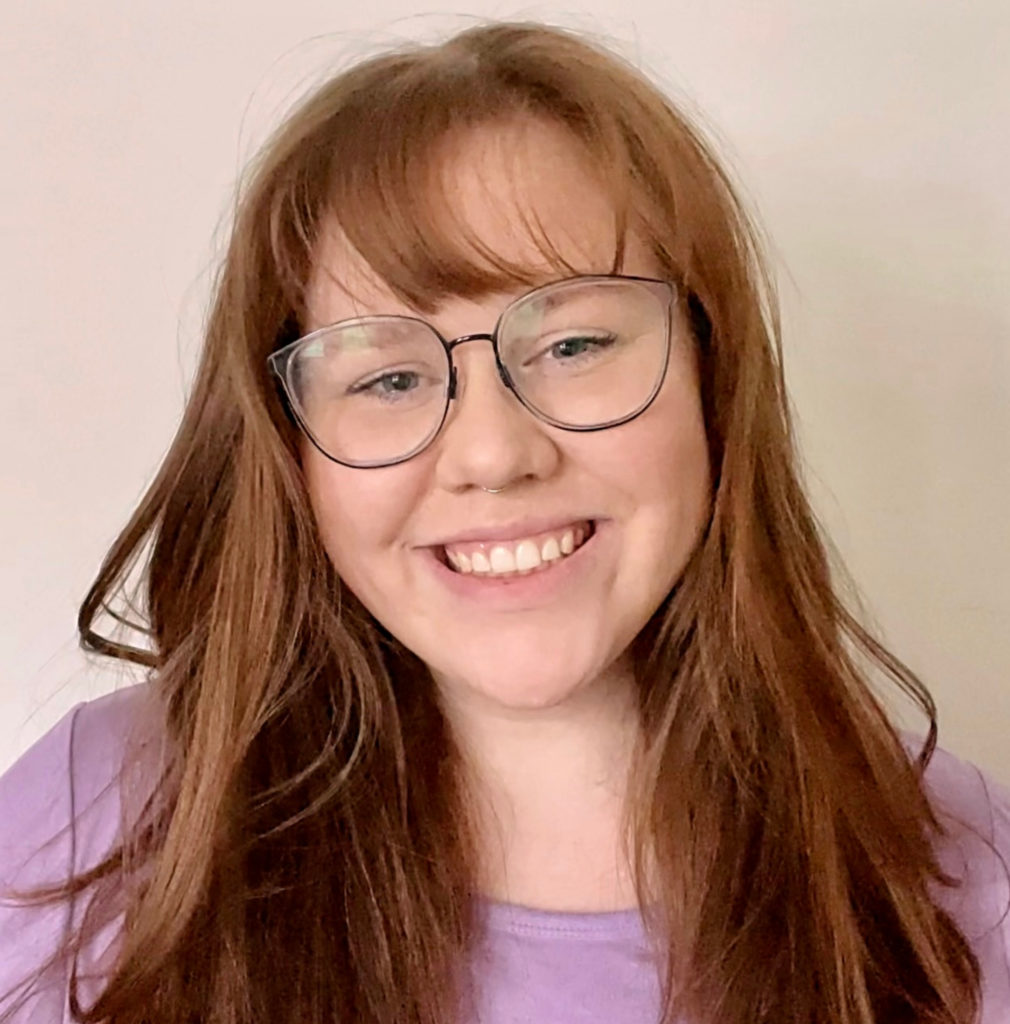
Meet Claire
Why did you choose DHD at UIC?
I chose to complete the DHD program at UIC because of the opportunity to gain further knowledge about disability and theories of disability that I hope to apply in my research.
What do you want to do with a DHD degree?
I would like to use my DHD degree to develop research that informs policy that is relevant and meaningful to the disability community.
Research Interests
Stigmatization, Ableism, Autism, Behavior Analysis, Policy
Education
M.S., Applied Behavior Analysis, Missouri State University, 2023